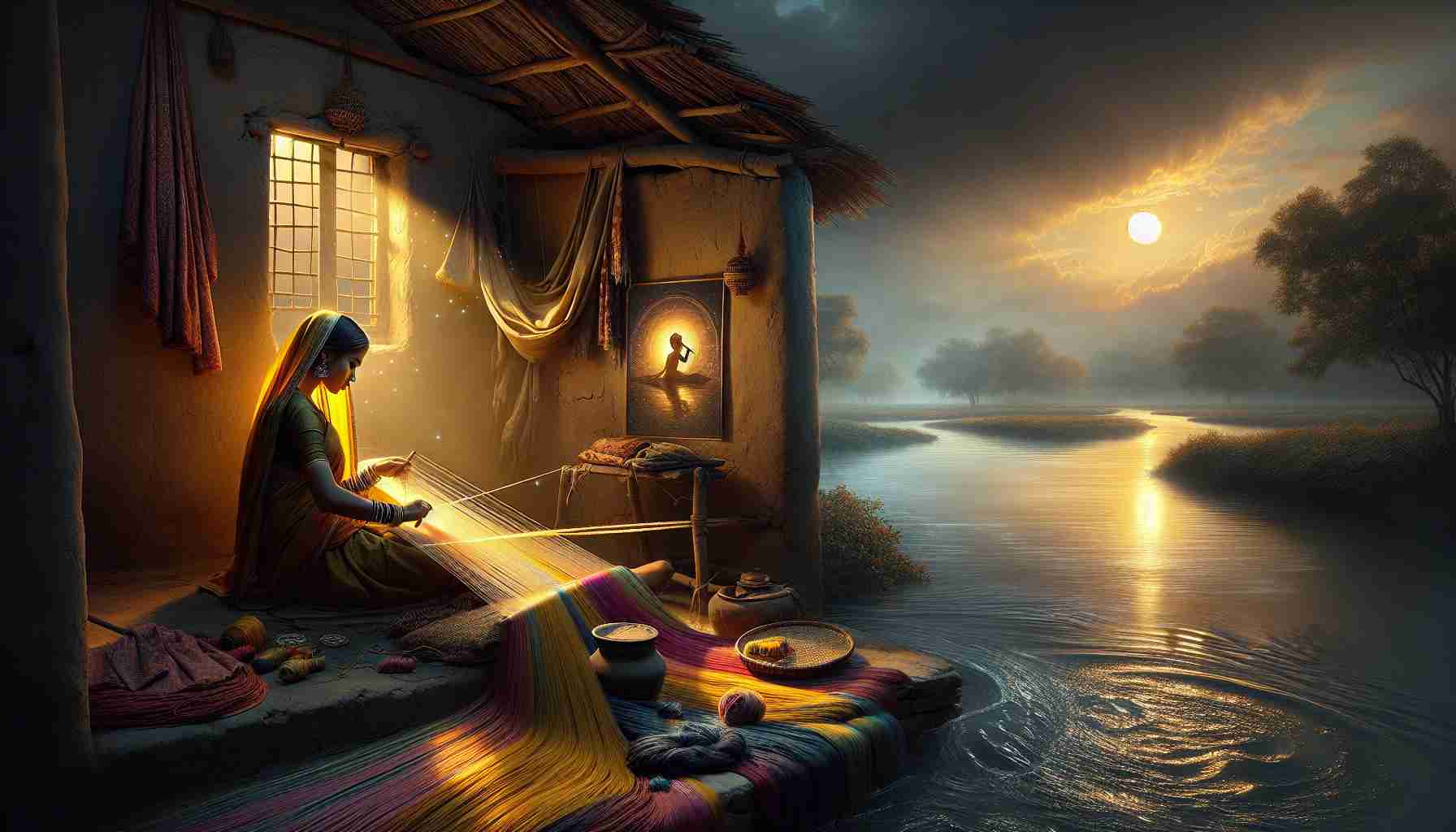

I am Rati, a weaver’s daughter from a small village near the banks of the Yamuna River. When my husband, Arjun, died suddenly in a cart accident last spring, it felt like someone had pulled the thread from the center of my life. Everything unraveled. We had shared twelve years, seven of them in struggle, five in laughter, and all of them in love.
The days after were heavy with silence. Everyone came with food, with words, with advice. But when the evenings came, and it was just me and the still air in our tiny clay home, I could hear only my questions. Why? Why him? Why now?
I stopped going to temple. I folded away my loom. The colors of my threads—once so full of life—looked dull and pointless. I avoided our shrine, even though my mother gently reminded me of Krishna—our ever-smiling Lord who plays the flute, who protects, who loves without end. But what did love mean if it could vanish so quickly?
One morning, I went to the river just after sunrise. I didn’t plan to. My feet simply carried me. The Ganga always has a way of calling and comforting. It was quiet except for the sound of water touching stone. I sat and watched an old woman light diyas—small earthen lamps—and send them into the current with whispered prayers.
As I sat there, a memory washed over me—Arjun singing at the Gita Jayanti gathering last year. He sang softly, holding my hand under the stars: "For the soul, there is neither birth nor death... It is not slain when the body is slain" (Bhagavad Gita 2.20).
I had heard that verse so many times, but now it was like a gift I had forgotten I had. Something in it changed how the air felt. I wasn’t alone. Arjun wasn't erased. He had shifted—like the river, always flowing, never staying the same, but never leaving, either.
I dipped my hands into the water and let the current move through my fingers.
Another verse filled my heart: "Whenever one falls, the Divine lifts them. Not a step of effort is ever wasted" (Bhagavad Gita 6.40). Somehow, I knew my love for him had not been wasted. And maybe my pain, too, had a place in the story being woven.
That afternoon, I returned home and uncovered the loom. Slowly, I began threading reds and golds through the warp. A new design. Not of mourning, but of continuing.
The Upanishads say, “From the unreal, lead me to the real. From darkness, lead me to light” (Brihadaranyaka Upanishad 1.3.28). I said that aloud as I wove, each word falling softly into the fabric like steady beats of hope.
Endings are not silent. They are the roots of new songs.
And I am learning to sing again.
I am Rati, a weaver’s daughter from a small village near the banks of the Yamuna River. When my husband, Arjun, died suddenly in a cart accident last spring, it felt like someone had pulled the thread from the center of my life. Everything unraveled. We had shared twelve years, seven of them in struggle, five in laughter, and all of them in love.
The days after were heavy with silence. Everyone came with food, with words, with advice. But when the evenings came, and it was just me and the still air in our tiny clay home, I could hear only my questions. Why? Why him? Why now?
I stopped going to temple. I folded away my loom. The colors of my threads—once so full of life—looked dull and pointless. I avoided our shrine, even though my mother gently reminded me of Krishna—our ever-smiling Lord who plays the flute, who protects, who loves without end. But what did love mean if it could vanish so quickly?
One morning, I went to the river just after sunrise. I didn’t plan to. My feet simply carried me. The Ganga always has a way of calling and comforting. It was quiet except for the sound of water touching stone. I sat and watched an old woman light diyas—small earthen lamps—and send them into the current with whispered prayers.
As I sat there, a memory washed over me—Arjun singing at the Gita Jayanti gathering last year. He sang softly, holding my hand under the stars: "For the soul, there is neither birth nor death... It is not slain when the body is slain" (Bhagavad Gita 2.20).
I had heard that verse so many times, but now it was like a gift I had forgotten I had. Something in it changed how the air felt. I wasn’t alone. Arjun wasn't erased. He had shifted—like the river, always flowing, never staying the same, but never leaving, either.
I dipped my hands into the water and let the current move through my fingers.
Another verse filled my heart: "Whenever one falls, the Divine lifts them. Not a step of effort is ever wasted" (Bhagavad Gita 6.40). Somehow, I knew my love for him had not been wasted. And maybe my pain, too, had a place in the story being woven.
That afternoon, I returned home and uncovered the loom. Slowly, I began threading reds and golds through the warp. A new design. Not of mourning, but of continuing.
The Upanishads say, “From the unreal, lead me to the real. From darkness, lead me to light” (Brihadaranyaka Upanishad 1.3.28). I said that aloud as I wove, each word falling softly into the fabric like steady beats of hope.
Endings are not silent. They are the roots of new songs.
And I am learning to sing again.